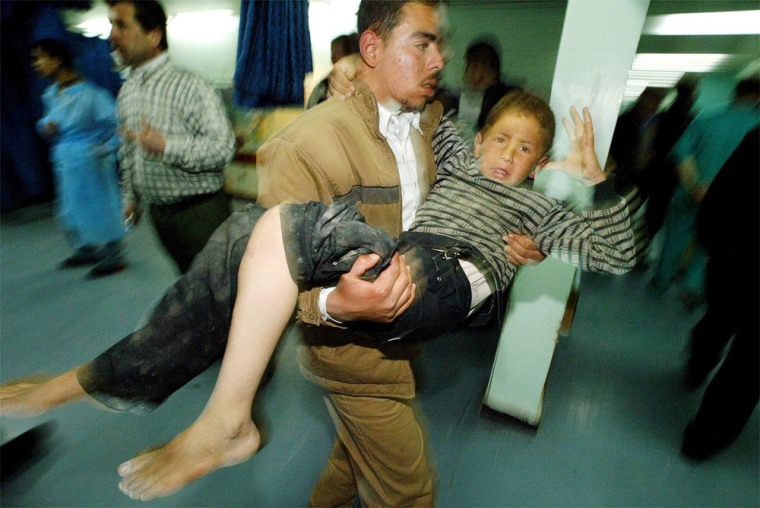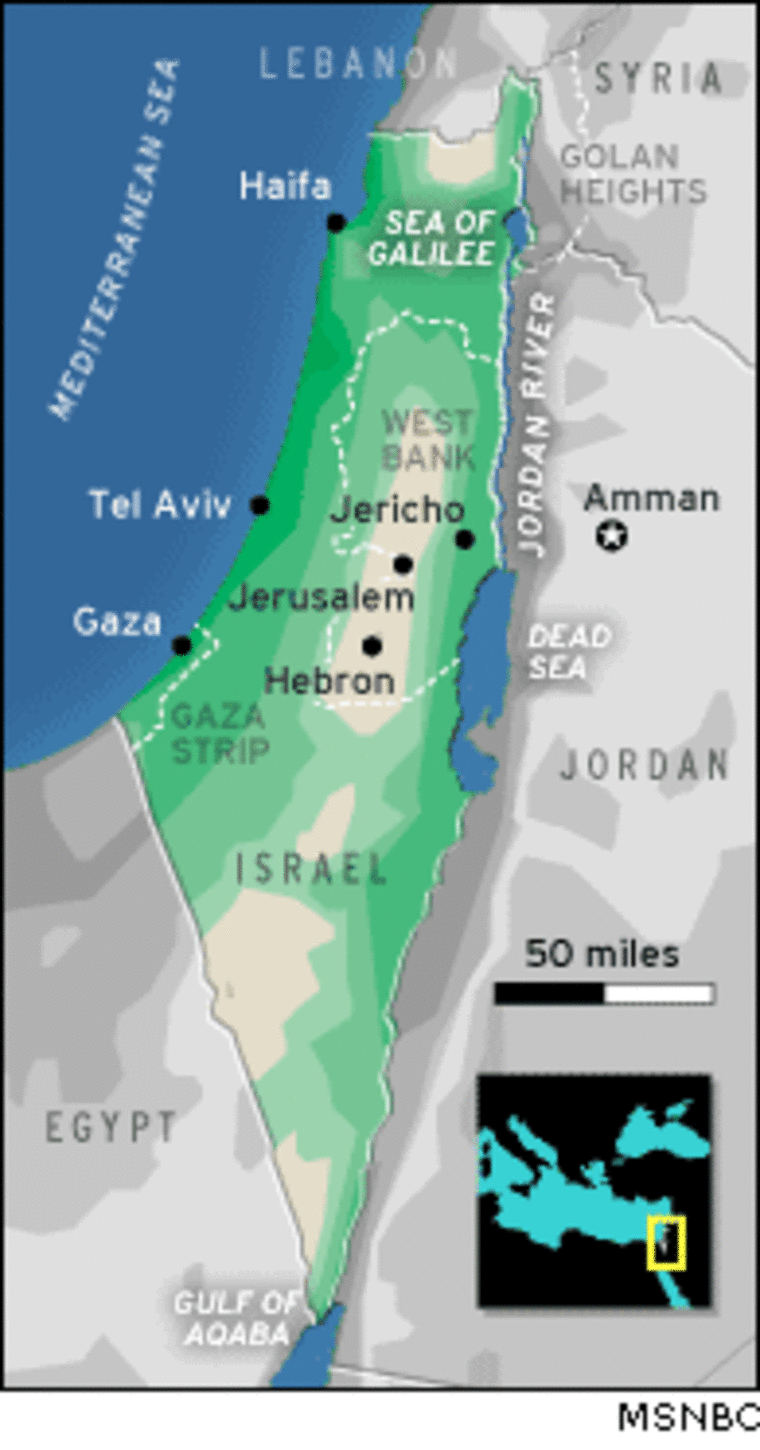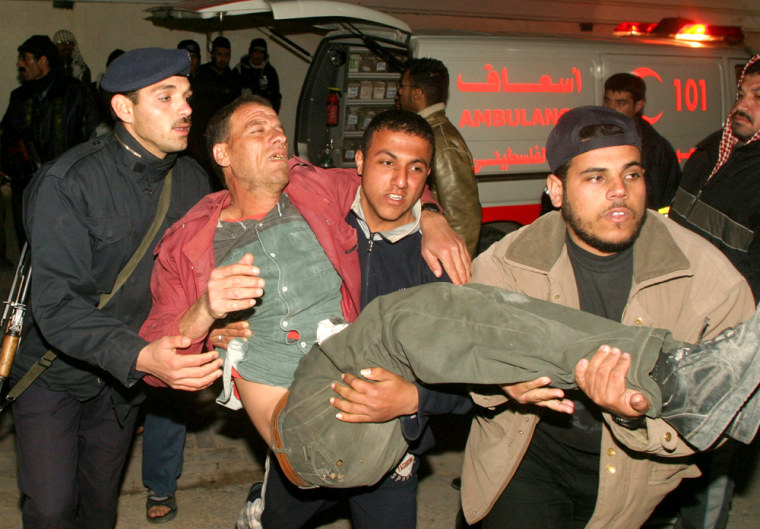Israeli helicopters fired two missiles in separate attacks on a Palestinian refugee camp on Wednesday, killing four people in a stepped-up campaign the army says is aimed at rooting out militants in the Gaza Strip.
Two unarmed teenage boys were among the dead, Palestinian officials said.
Islamic militants also traded fire with Palestinian security forces in downtown Gaza City during morning rush after a car carrying armed men refused to stop for a police inspection, witnesses said. One civilian was killed and 17 people were hurt, Palestinian officials said. The confrontation raised new concerns about growing chaos in Gaza.
Israel launched the new offensive into Gaza late Tuesday in response to a double suicide bombing earlier this week at the Israeli seaport of Ashdod that killed 10 Israelis. Security officials also have said they want to strike hard at militants ahead of a possible Israeli withdrawal from Gaza.
Since the start of the operations, six Palestinians have been killed and 32 others wounded in a series of attacks.
Missiles fired into crowds
In Wednesday’s missile strikes, both in the Rafah refugee camp, the army used the rare tactic of firing into a crowd of suspected gunmen. The vast majority of Israeli air strikes are aimed at specific targets, like cars carrying militants, based on intelligence reports.
The army said it fired the missiles after groups of militants approached troops. Ground forces raided the camp, located on the border with Egypt, overnight Wednesday to uncover tunnels used by weapons smugglers, it said.

During the searches, Palestinians fired grenades, anti-tank missiles and bombs, it said. No Israeli casualties were reported.
In the first missile strike, the army said a group of gunmen tried to place a powerful bomb along a road used by the military. Two people were killed.
Later Wednesday, a helicopter fired a second missile at a group of militants that approached soldiers, the army said.
But residents said the crowd included civilians. Residents and hospital officials said two unarmed 14-year-old boys were killed, and four other people were wounded.
After nightfall, an Israeli tank fired a shell at the camp, wounding six men, Palestinians said.
Palestinians said Israeli troops also demolished seven homes.
On Tuesday night, a helicopter strike in Gaza City killed two Palestinians and wounded 14, including a 2-year-old girl. The Israeli military said the building destroyed in the attack housed “Islamic Jihad terrorists, involved in attacks against Israelis.”
However, the two people killed were apparently bystanders walking outside the house, according to Palestinian officials and hospital doctors.
Retaliation
Prime Minister Ariel Sharon’s Security Cabinet approved the campaign of stepped-up raids into Gaza on Tuesday. The offensive could include the assassinations of Palestinian militants, including leaders of violent Hamas and Islamic Jihad groups, an Israeli security official said.

That decision followed Sunday’s double suicide bombing at the Ashdod seaport, the first successful attack against an Israeli strategic target in more than three years of violence. It also marked the first time that Palestinian bombers were able to sneak out of the fenced-in Gaza Strip to carry out an attack.
On Wednesday, Israel partially closed the Ashdod port after discovering hand grenades hidden in a container, security sources said on condition of anonymity. No further details were immediately available.
Sharon has said if peace talks remain stalled, he might order a pullout from Gaza, removing settlements, while imposing a boundary in the West Bank. Violence in Gaza has been increasing, with both sides intent on portraying a pullout as a victory.
At his West Bank headquarters, Arafat denounced the Israeli offensive Wednesday. “They want to destroy Gaza before they leave it, but our people do not kneel,” he said.
In Washington, State Department spokesman Adam Ereli said Israel was the victim of terrorism and had a right to defend itself, although it should be sensitive to the consequences of its military actions.
Palestinian factions vie for control of Gaza Strip
With Israel talking of a Gaza pullout, Palestinian factions appear to be vying for control of the impoverished coastal strip. Wednesday’s shootout during Gaza City rush hour erupted despite a pledge by rival Palestinian factions to accept the authority of the security forces.
The confrontation began when a carload of gunmen from Hamas refused to halt for an inspection at a Palestinian police roadblock in the center of the city, Palestinian security officials said.
The militants then threw hand grenades, killing one civilian and injuring 17 others, the officials said.
Police chased the car, and special forces with red berets ran across an empty lot and up an alley to try to outflank the gunmen. The sound of ambulance sirens and automatic weapons fire mingled with the honking horns of gridlocked cars.
Many of those hurt were members of security forces under the leadership of Yasser Arafat’s cousin, Moussa Arafat.
Palestinian security forces have stepped up car inspections in recent days and beefed up their presence in the streets as part of a new security plan that has won the tentative backing of rival factions.
However, it remains unclear whether the armed groups will accept the centerpiece of the plan — a ban on carrying weapons in public.
